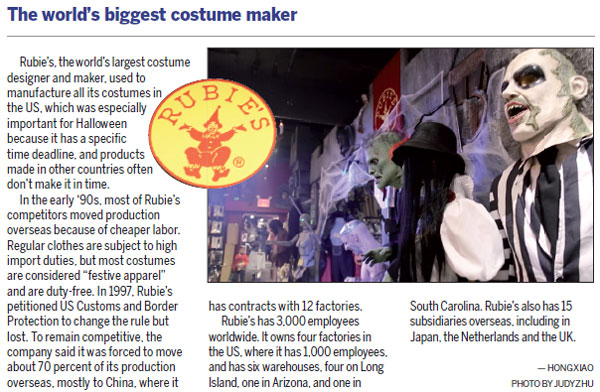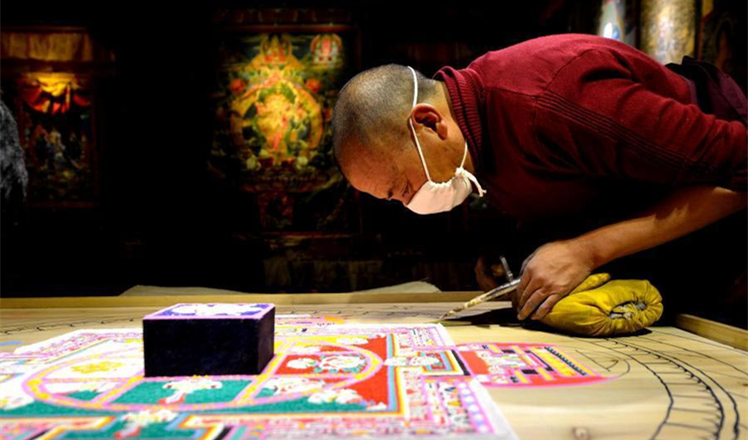Behind the Masks
Updated: 2016-10-28 11:27
By Hong Xiao and Ai Heping in New York.(China Daily USA)
|
|||||||||

Yale University told students in an emailed message to wear a costume that "respects your classmates". And guidelines issued by North Carolina State University include a question: "Ask yourself, would you wear the costume in front of people from that group? If not, then don't do it."
The University of Florida, where in previous years some students posted photographs of themselves in blackface, issued a memo, saying, "If you choose to participate in Halloween activities, we encourage you to think about your choices of costumes and themes. Some Halloween costumes reinforce stereotypes of particular races, genders, cultures or religions."
The school also has a hotline for people who see offensive Halloween costumes, and it's offering counseling to students who become offended by costumes.
"Some Halloween costumes reinforce stereotypes of particular races, genders, cultures, or religions. Regardless of intent, these costumes can perpetuate negative stereotypes, causing harm and offense to groups of people," the school wrote on its blog.
The school urged students who are disturbed by any Halloween shenanigans to seek counseling at the U Matter, We Care program.
Students at the University of Colorado Boulder have also been told to avoid "white trash" costumes and anything that portrays a particular culture as "oversexualized", which the university says includes dressing up as a geisha or a "squaw". A university spokesman called cowboy costumes a "crude stereotype".
Students were also asked not to host parties with offensive themes, including those with "ghetto" or "hillbilly" themes or those associated with "crime or sex work".
Students at the University of Minnesota-Twin Cities were told by officials to "please keep in mind that certain Halloween costumes inappropriately perpetuate racial, cultural, and gender stereotypes".
At Tufts University in Medford, Massachusetts, members of the school's sororities and fraternities have been told they could face "serious disciplinary sanctions" - including a possible investigation by the campus police - for wearing Halloween costumes that offend peers or make the campus community "feel threatened or unsafe".
Message relay
The warning was part of a letter to the presidents of the organizations signed by various Greek Life council leaders, who asked the chapter presidents to relay the message to their members.
The letter stated in part that "Greek Brothers and Sisters have worn costumes that appropriate cultures and reproduce stereotypes on race, gender, sexuality, immigrant or socioeconomic status. Outfits relating to tragedy, controversy, or acts of violence are also inappropriate. It is our mission to promote spaces that allow members of the Tufts community to have fun without feeling as though any part of their identity is being misrepresented or targeted."
Costume police
But the costume-policing trend at schools has raised concerns about overreach by the schools and violations of free expression.
At Tufts, Jake Goldberg, a student and founder of Students Advocating for Students, a free speech advocacy group, said that "this campus, as well as many other universities around the country, have fundamentally inverted the meaning of tolerance."
"Many of my friends have felt compelled to alter their costume plans out of fear of administrative retaliation," he said. "Merely unintentionally offending somebody with your costume could cause a Tufts student to face severe discipline. A truly tolerant campus would ignore unfavorable costumes, a truly totalitarian campus would censor them. It seems quite clear based off of Tufts' policy which category the university falls into."
The restrictions and warnings haven't been limited to the US.
At Brock University in Ontario, Canada, a costume "protocol" lists prohibited costumes at the campus Halloween party, including ankle-length robes worn by Arab men, makeup depicting Japanese geishas, anything with the Confederate flag on it, costumes depicting the transgender celebrity Caitlyn Jenner and traditional or religious headdresses such as feathered bonnets and turbans.
It was developed by the student union, and followed an outcry two years ago over a group of students who dressed in blackface as the Jamaican bobsled team.
Change of space
Students were told that "if a member of your party is denied entry because of their costume, they will be escorted to a space where they can change or remove the offending item".
Richard Moon, a law professor at the University of Windsor in Ontario, whose research focuses on freedom of expression, told the National Post, "It seems entirely appropriate for an institution to ask students to think about why they might be wearing a particular costume. Does it involve denigrating or mocking disadvantaged groups?"
If the answer is yes, then it may be appropriate to restrict those costumes. Where universities must be careful is imposing broad restrictions for superficial reasons, Moon said.
Contact the writer at xiaohong@chinadailyusa.com
- Hefty award offered for deciphering oracle bone characters
- China Daily brings you 'sixth plenums' in past 35 years
- Party ramps up supervision
- 400,000 migrant workers flock to Xinjiang to harvest cotton
- China anticipates booming job market in 2016
- Online shopping platform selects cat as 'chief cute officer'
- Asia American leaders discuss civic engagement
- World's disabled get new champion
- Clinton, Michelle Obama make first joint campaign appearance
- Miss Philippines wins 2016 Miss International Beauty Pageant
- Trump's Hollywood Walk of Fame star destroyed
- Maduro activates Defense Council to seek solution to crisis

 2016 Comedy Wildlife Photography Awards Finalists
2016 Comedy Wildlife Photography Awards Finalists
 NINED VR creates splash with virtual reality products
NINED VR creates splash with virtual reality products
 Splendid Sichuan captured in photos
Splendid Sichuan captured in photos
 Chinese baozi shop gains popularity in Harvard Square
Chinese baozi shop gains popularity in Harvard Square
 Chinese mariner on record-breaking voyage goes missing
Chinese mariner on record-breaking voyage goes missing
 2045-square-meter photo mosaic breaks world record
2045-square-meter photo mosaic breaks world record
 Red leaves reveal beauty of autumn
Red leaves reveal beauty of autumn
 Tibet mandala: The world in a grain of sand
Tibet mandala: The world in a grain of sand
Most Viewed
Editor's Picks

|

|

|

|

|

|
Today's Top News
'Zero Hunger Run' held in Rome
Trump outlines anti-terror plan, proposing extreme vetting for immigrants
Phelps puts spotlight on cupping
US launches airstrikes against IS targets in Libya's Sirte
Ministry slams US-Korean THAAD deployment
Two police officers shot at protest in Dallas
Abe's blame game reveals his policies failing to get results
Ending wildlife trafficking must be policy priority in Asia
US Weekly

|

|









